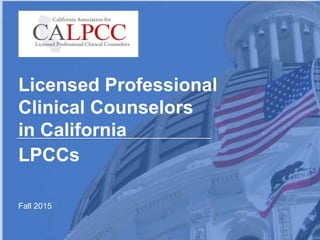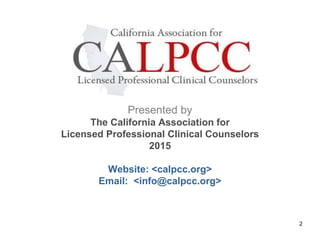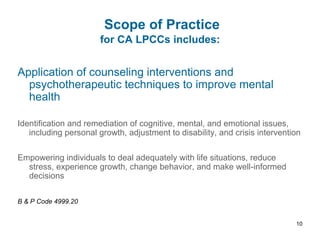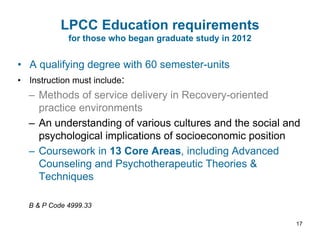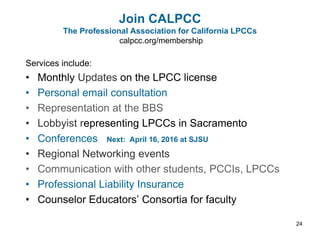LPCCs in California
- 1. 1 Licensed Professional Clinical Counselors in California Fall 2015 LPCCs
- 2. 2 Presented by The California Association for Licensed Professional Clinical Counselors 2015 Website: <calpcc.org> Email: <info@calpcc.org>
- 3. 3 Each state now licenses three mental health professions at the master’s level: • Licensed Professional Counselors (LPCs) (also named LPCCs, LCPCs, LCMHCs) – Over 126,000 nationwide* (Over 1,300 in CA**) • Licensed Marriage & Family Therapists (LMFTs) – Almost 58,000 nationwide* (Over 38,000 in CA**) • Licensed Clinical Social Workers (LCSWs) – Over 225,000 nationwide* (Over 23,000 in CA**) *American Counseling Association: 2013 Statistics on Mental Health Professions **Board of Behavioral Sciences: 2015 statistics
- 4. 4 It has taken many years for these mental health professions to be licensed in every state: – LPCs: 34 years (1976 - 2009) – LMFTs: 46 years (1963 - 2009) – LCSWs: 47 years (1945 – 1992)
- 5. 5 What got the effort going in California? • LPCs from other states could not get licensed in California – Only those who focused their degrees on marriage and family could become LMFTs • It was a restraint of trade for experienced LPCs from other states
- 6. 6 How long did it take to get the LPCC in California? • Preparation: – 2002 - 2004: Twelve California counselor professional associations incorporated as the California Coalition for Counselor Licensure (CCCL), raised funds, drafted bill language, worked with stakeholders, regulators, engaged lobbyists • Three bills over five years in the state legislature: – 2005: AB 894 – 2007: AB 1486 – 2009: SB 788 was signed by Governor • The LPCC bill became law January 1, 2010
- 7. LPCC Milestones • August 2010: CCCL became CALPCC, a membership association to protect and support the LPCC • February 2012: The first LPCC licenses were issued • February 2014: DHCS announced that LPCCs are qualified providers of Medi-Cal specialty mental health services 2015: • Over 1,300 LPCCs are licensed; Over 1,400 PCCIs are registered • The BBS has reviewed at least 67 CA university programs, so students can see which programs will meet the LPCC requirements. • About half of CA’s 63 counties have updated their job descriptions to include PCCIs and LPCCs • Most private insurance companies are reimbursing LPCCs 7
- 8. 8 LPCs across the country… • Work with individuals, families, and groups • Treat mental, behavioral and emotional problems and disorders • Make up a large percentage of the U.S. mental health workforce • Are employed in mental health centers, agencies, and organizations across the country • Are covered by managed care organizations and health plans • Work with active duty military personnel and their families, as well as veterans (DoDs, TRICARE, VA) • American Counseling Association, Who Are Licensed Professional Counselors
- 9. What Code of Ethics do LPCCs Use? The BBS and CALPCC use the 2014 ACA Code of Ethics* as the standard of practice for California LPCCs and PCCIs Download: *The American Counseling Association at <counseling.org> California Association for Licensed Professional Clinical Counselors at <calpcc.org> under About Us 9
- 10. 10 Scope of Practice for CA LPCCs includes: Application of counseling interventions and psychotherapeutic techniques to improve mental health Identification and remediation of cognitive, mental, and emotional issues, including personal growth, adjustment to disability, and crisis intervention Empowering individuals to deal adequately with life situations, reduce stress, experience growth, change behavior, and make well-informed decisions B & P Code 4999.20
- 11. LPCCs in CA Can Treat Couples and Families If they have completed: – 6 semester-units (or 9 quarter-units) focused on marriage & family theory & practice and – 500 hours of supervised experience with couples, families or children and – 6 hours of CE credits in MFT in each renewal cycle B & P Code 4999.20 11
- 12. California LPCCs/PCCIs Can Provide: • Individual and group therapy for adults and children • Collateral services to couples and families • Couple and family therapy: – if they have the required additional MFT education and training or – if they are gaining supervised hours under an approved supervisor • LPCCs can provide: • Supervision of ASWs • Supervision of PCCIs and MFTIs earning the 500 hours: – if they have the required additional MFT education and training Pending BBS regulation 1820.5 – 7 (for clarification) 12
- 13. BBS will soon verify MFT education and training for LPCCs January 2016: • LPCCs, who want to treat couples and families, can submit documentation of MFT coursework and supervised hours to the BBS • BBS will provide written confirmation that MFT requirements are met • LPCCs will provide this confirmation to clients, supervisees and employers Pending BBS regulation 1820.5 – 7 13
- 14. 14 What does the Scope not include? for CA LPCCs • Projective techniques in the assessment of personality • Individually administered IQ tests • Neuropsychological testing • Utilization of a battery of 3 or more tests to determine presence of psychosis, dementia, amnesia, cognitive impairment or criminal behavior B & P Code 4999.20
- 15. Equivalency to mental health licenses at the master’s level in CA • The Board of Behavioral Sciences considers LPCCs to be on par with LMFTs and LCSWs • The requirements for the California LPCC are on par, or exceed, the requirements for LPCs in other states. 15
- 16. 16 Comparison of Scopes LPCC from B & P Code 4999 Empowers individuals to deal adequately with life situations, reduce stress, experience growth, change behavior and make well-informed, rational decisions LMFT from B & P Code 4980 Enables individuals to mature and grow within marriage and family. Examines interpersonal relationships to achieve more adequate, satisfying and productive marriage and family adjustments LCSW from B & P Code 4996 Directed at helping people achieve more adequate, satisfying and productive social adjustments. Provides or arranges for social services, helps communities to organize, improves social or health services. Applies a variety of counseling interventions and psychotherapeutic techniques to identify and remediate cognitive, mental and emotional issues, for the purposes of improving mental health Applies marriage and family therapy principles and methods, including psychotherapeutic techniques, to serve individuals, couples and groups Includes counseling and applied psychotherapy of a non-medical nature with individuals, families and groups
- 17. LPCC Education requirements for those who began graduate study in 2012 • A qualifying degree with 60 semester-units • Instruction must include: – Methods of service delivery in Recovery-oriented practice environments – An understanding of various cultures and the social and psychological implications of socioeconomic position – Coursework in 13 Core Areas, including Advanced Counseling and Psychotherapeutic Theories & Techniques B & P Code 4999.33 17
- 18. 18 2012 LPCC Core Content Areas Counseling & psychotherapy Human Growth & Development Career Development Group Counseling Assessment Multicultural Counseling Diagnostic Process Research and Evaluation Professional Orientation (Law & Ethics) Psychopharma- cology Addictions Counseling Crisis or Trauma Counseling
- 19. Additional Coursework 15 semester-units (22.5.quarter units) of advanced coursework to develop knowledge of specific treatment issues or special populations Examples: – School counseling – Rehabilitation counseling – Creative arts therapies – Career counseling – Mental health counseling – Marriage and Family counseling B & P Code 4999.33 19
- 20. Pre-degree Practicum or Field Study 6 semester-units (9 quarter-units) of supervised practicum or field study in a clinical setting that provides a range of professional counseling experience: – Applied psychotherapeutic techniques – Diagnosis – Treatment Must include 280 hours of face-to-face supervised clinical experience counseling individuals, families or groups B & P Code 4999.33, 4999.36, 4999.47 20
- 21. LPCC Supervision Requirements • 3,000 post-degree hours of clinical mental health experience related to the practice of professional clinical counseling • Professional Clinical Counselor Interns (PCCIs) are regulated by the BBS • B & P Code 4999.42 – 4999.48 21
- 22. LPCC Examination Requirements Two exams are required for licensure: California Law & Ethics Exam for LPCCs Beginning Jan 1, 2016, PCCIs are required to take this exam in the first year of internship National Clinical Mental Health Counselor Exam Taken upon completion of all supervised hours, education requirements and passage of the CA Law & Ethics Exam B & P Code 4999.53, BBS Regulations 1805, 1806, 1816, 1822, 22
- 23. 23 Regulating Agency • The California Board of Behavioral Sciences (BBS) regulates LMFTs, LCSWs, LPCCs, and LEPs • The Board currently includes 13 members: 2 LMFTs, 2 LCSWs, 1 LEP, 1 LPCC and 7 public members
- 24. Join CALPCC The Professional Association for California LPCCs calpcc.org/membership Services include: • Monthly Updates on the LPCC license • Personal email consultation • Representation at the BBS • Lobbyist representing LPCCs in Sacramento • Conferences Next: April 16, 2016 at SJSU • Regional Networking events • Communication with other students, PCCIs, LPCCs • Professional Liability Insurance • Counselor Educators’ Consortia for faculty 24
- 25. 25 For Additional Information Visit the CALPCC website Website: calpcc.org Email: info@calpcc.org
Editor's Notes
- #2: Welcome! This presentation is being recorded in the fall of 2015 for those who would like to learn more about Licensed Professional Clinical Counselors in California. My name is Dean Porter and I am the Executive Director of the California Association for Licensed Professional Clinical Counselors (CALPCC).
- #3: CALPCC is the successor to the California Coalition for Counselor Licensure, which advocated for 5 years in the State Legislature to get this licensure bill passed.
- #4: Each state now licenses 3 mental health professions at the master’s level, LPCs, LMFTs, and LCSWs. LPC is the most commonly used term for professional counselors, but some states, like CA, have added the word clinical or mental health to the LPC. In 2013 there were over 126,000 LPCs, about 58,000 LMFTs, over 225,000 LCSWs in the country, according to the American Counseling Association. In 2015 CA has over 1,300 LPCCs, while it has over 38,000 LMFTs, which is more than half the LMFTs in the country. LMFTs got an early start in CA. CA also has over 23,000 LCSWs.
- #5: California was the first state to license LCSWs in the 40s, and LMFTs in the 60s, and the last state to license LPCCs at the end of 2009.
- #6: This is where I got involved. It did not seem right that there was no license for experienced licensed counselors coming to California from other states. So, we formed the California Coalition for Counselor Licensure, comprised of 12 CA professional associations.
- #7: The California Coalition spent two years in preparation and then five years in the legislature until the third bill passed. The reason it took so long to get a counselor licensure bill passed, was that it had opposition from some of the sister professions. While the Social Workers were neutral and the psychiatrists agreed early on to support the license, if our Interns would earn 150 supervised hours in a hospital or community mental health setting, we had to take restrictions in our scope of practice from the psychologists and from one LMFT association, and agree to grandparent LMFTs for a short time with the other MFT association. The bill passed at the end of 2009 and became law in 2010.
- #8: Once the bill passed, the Coalition became a membership association, now known as CALPCC, that would protect and support the new license. It took two years for the Board of Behavioral Sciences to develop regulations and applications before they could issue the first licenses in 2012. The next milestone was 2014, when the Department of Health Care Services in California determined that LPCCs could be reimbursed by Medi-Cal. In 2015….
- #9: According to the American Counseling Association, ….
- #10: The 2014 American Counseling Association Code of Ethics is used across the nation for LPCs and it is used as the standard of practice for LPCCs in California by the BBS and by CALPCC. This ethical code is used in the California LPCC Law & Ethics Exam. This Ethical Code can be downloaded from the ACA or CALPCC websites.
- #12: This additional education and training is the result of a compromise with the CA Chapter of AAMFT in order to get the LPCC bill passed in the legislature. This additional education and training is only required if a LPCC wants to see couples and families. It is not required for the LPCC license. No other state requires LPCs or interns to have additional education and training in order to provide couple and family therapy. Note that supervised hours with children count toward this requirement. This is confusing, since LPCCs and PCCIs are already allowed to work with children, but this is what is allowed for MFTIs, so PCCIs inherited it.
- #13: So, what does collateral services mean? When working with an individual, LPCCs or PCCIs can have contact with the family, including treatment planning, recommending resources, monitoring progress, or termination and aftercare planning. LPCCs ad PCCIs can provide couple and family therapy if………. LPCCs can provide So, currently only a LMFT or a LPCC, who has met the additional MFT education and training requirements can supervise the 500 hours. As of January 2016, a new BBS regulation will add LCSWs, clinical psychologists and board certified psychiatrists, who are competent to practice marriage and family therapy, as possible supervisors of LPCCs or PCCIs earning the 500 MFT hours. The rationale is that while CA LPCCs have this MFT restriction in their Scope, the other professions do not. :-) Although it is a good idea to have completed some of the MFT coursework before beginning the 500 hours, the new regulation does not specify when the coursework is to be completed.
- #14: This verification is something that the counties have requested, and will facilitate their hiring of LPCCs.
- #15: What else does the Scope not include? Due to a compromise with the California Psychological Association, in order to get the LPCC bill passed, LPCCs cannot administer the tests that are listed here, even if they have the education and training to do so.
- #17: This chart, with sentences taken from the Scopes of Practice, indicates that all three license types at the master’s level are licensed to provide psychotherapy in CA, but each license type has a different focus in its scope of practice and education. The top row of this chart indicates the purpose of the practice and the bottom row indicates how each license type achieves its purpose. I like to think of the bottom row as the common denominator and the top row as the numerator, where the differences are seen. LPCCs focus on the general practice of mental health counseling, and many develop a counseling specialty, such as rehabilitation, career, mental health, creative arts therapies, school counseling, marriage and family therapy, etc. LMFTs focus on marriage and family therapy and LCSWs focus on social work.
- #18: Advanced Counseling Psychotherapeutic Theories and Techniques is the 13th Core Area. The other 12 are presented in a chart on the following slide.
- #19: 3 semester-units (4.5 quarter-units) are required in each of the 13 Core Areas. Ten of the Core Areas must be included in the degree. Three of the Core Areas may be added post-degree, but the BBS is working on an amendment that would not allow Assessment or Diagnosis to be remediated post-degree. Out-of-state applicants are allowed to remediate 6 core courses, but they, too, will not be allowed to remediate Assessment or Diagnosis.
- #20: In addition to the 13 core areas, these 15 units allow LPCC students to develop an area of specialty or expertise. Many counselors then gain national certificates in one of these specialty areas.
- #21: The practicum must be included within the degree and cannot be remediated post-degree. The graduate programs have oversight of the pre-degree practicum hours. The 280 hours are the national standard.
- #22: The supervision requirement for the LPCC is 3,000 post degree hours Pre-degree practicum hours do not count toward the post-degree 3,000-hour requirement. This is the national standard and we have tried to make CA LPCCs as portable as possible to other states.
- #23: Two exams are required for the LPCC licensure…..PCCIs who do not pass the Law and Ethics Exam during their first year of internship must take a 12-hour course in CA Law & Ethics and retake the exam in the next renewal cycle. The last step to licensure is the NCMHCE ……
- #24: The LPCC is regulated by the BBS, which also regulated LMFTs, LSCWs and Licensed Educational Psychologists. LPCCs are currently represented by one LPCC. When there are more LPCCs, we will change the law to include two LPCC representatives on the BBS Board.
- #25: We invite students, faculty, interns and licensees to join CALPCC. Services include…… Current CALPCC Membership dues: Students/interns $30; Professionals $100, although there may be a slight increase in 2016. (CALPCC endorses HPSO Professional Liability Insurance. Students: $23, First year grads: $57, Employed Professionals: $111. Self-employed Professional rates vary, depending on full time vs part time. HPSO gives a 10% discount for CALPCC conference attendance. The next conference: April 16, 2016 at SJSU.) The Counselor Educators’ Consortia usually meets at the CALPCC conference and at other times a year upon request. The Consortia meetings usually include the LPCC representative to the BBS and a BBS staff member. The purpose of these meetings is to get answers to questions about the LPCC and to share common experiences.
- #26: This concludes our slide presentation. Please visit our website for further information about the license or to become a CALPCC member. Questions about the license can be submitted to <info@calpcc.org>.

